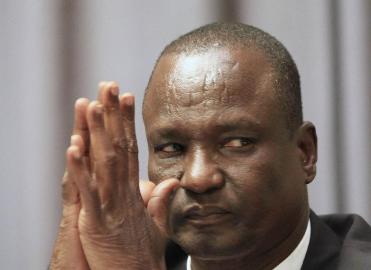S. Sudanese rebels protest inclusion of stronghold in ceasefire monitoring
February 27, 2014 (JUBA) – South Sudanese rebels on Wednesday said they would not accept the mediators’ decision to include Nasir, one of its strongholds in Upper Nile state, among the ceasefire monitoring and verification mechanism areas.

The official, in a release extended to Sudan Tribune, said they were “disappointed” over the unilateral signing of the implementation modalities in support of the Agreement on Cessation of Hostilities (CoH) by Juba and witnessed by IGAD Mediators, without taking into consideration concerns made by opposition forces.
“The initial agreed areas of deployment were Juba, Malakal, Bor, and Bentiu. This is in accordance with the provision of Articles 5.2 and 6b of the Cessation of Hostilities Agreement based on the requirements on the ground. The IGAD special envoys may deploy additional monitors in consultation with the parties. After selecting the four areas noted above, the Joint Technical Committee (JTC) team included Akobo unilaterally after protracted discussion which IGAD consented to it,” the 26 February release partly reads.
“However, after JTC team visited Akobo, they decided to visit Nasir without consulting with the SPLM/A. The JTC team then added Nasir to the list without consultation and consent of the SPLM/A. Hence SPLM/A rejects any attempt to include Nasir as one of locations for the Monitoring and Verification Teams (MVTs) to monitor without taking into consideration issues raised”, the statement reads in part,” added the release, notifying the international community and the people of South Sudan.
There are fears within government that the rebels could use Nasir, a strategic area located at its border with neigbouring Ethiopia, as a base to receive military supports from outside allegedly without the knowledge of the Ethiopian government.
The rebels, it’s lead negotiator said, would only accept IGAD’s decision, if the purpose of deploying the monitoring and verification teams is to monitor movement of troops, deployment or redeployment, supply routes, sources of threat, and humanitarian access, includes area such as Nimule, Kaya, Nadapal, Parieng, Kwajok and Rumbek.
He also expressed concerns that the JTC chairperson never gave opposition forces sufficient time for consultation, adding that this lack of consultation may not provide conducive environment for monitoring and implementation of the ceasefire agreement.
Gai, however, reiterated the full commitment of his group to signing of the Implementation Modalities in Support Of the Agreement on Cessation of Hostilities (CoH), once the issues, concerns and reservations raised are resolved.
DELAYED TACTICS
The rebels earlier accused President Salva Kiir of using “delayed tactics” to undermine the monitoring and verification mechanism of the ceasefire, which formed the basis of the truce signed in Addis Ababa as part of efforts to end the conflict.
Such a move, according to the head of the rebel delegation, enabled the South Sudanese army (SPLA) to “make a mockery” of the ceasefire and thus launch attacks on rebels.
But the spokesperson of the army, in a separate interview with Sudan Tribune, accused the SPLM-In-Opposition forces of violating the agreed ceasefire, citing attacks on Malakal, which the rebels claim to control.
“Our forces have always respected the cessation of hostilities agreement, but this has continuously been violated by the rebel forces of Riek Machar,” said Philip Aguer.
(ST)
